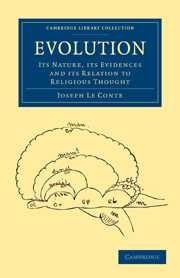Book contents
- Frontmatter
- PREFACE TO THE SECOND EDITION
- PREFACE TO THE FIRST EDITION
- Contents
- PART I WHAT IS EVOLUTION?
- CHAPTER I ITS SCOPE AND DEFINITION
- CHAPTER II THE RELATION OF LOUIS AGASSIZ TO THE THEORY OF EVOLUTION
- PART II EVIDENCES OF THE TRUTH OF EVOLUTION
- PART III THE RELATION OF EVOLUTION TO RELIGIOUS THOUGHT
- Index
CHAPTER II - THE RELATION OF LOUIS AGASSIZ TO THE THEORY OF EVOLUTION
Published online by Cambridge University Press: 29 August 2010
- Frontmatter
- PREFACE TO THE SECOND EDITION
- PREFACE TO THE FIRST EDITION
- Contents
- PART I WHAT IS EVOLUTION?
- CHAPTER I ITS SCOPE AND DEFINITION
- CHAPTER II THE RELATION OF LOUIS AGASSIZ TO THE THEORY OF EVOLUTION
- PART II EVIDENCES OF THE TRUTH OF EVOLUTION
- PART III THE RELATION OF EVOLUTION TO RELIGIOUS THOUGHT
- Index
Summary
In order to clear up the conception of evolution, it is necessary to give a brief history of the idea, and especially to explain the relation of Louis Agassiz to that theory. This is the more necessary, because there is a deep and wide-spread misunderstanding on this subject, and thus scant justice has been done our great naturalist, especially by the English and Germans; and also because this relation is an admirable illustration of an important principle in scientific philosophy.
Like all great ideas, we find the first germs of this in Greek philosophy, in the cosmic speculations of Thales and Pythagoras. Next (about 100 B. C.) we find it more clearly expressed by the Roman thinker, Lucretius, in his great philosophic poem entitled “De Rerum Natura.” After a dormancy of nearly eighteen centuries it next emerges with still more clearness in the theological speculations of Swedenborg and the philosophical speculations of Kant. All these we pass over with bare mention, because these thinkers approached the subject from the philosophic rather than the scientific side—in the metaphysical rather than the scientific spirit.
The first serious attempt at scientific presentation of the subject was by the celebrated naturalist, Lamarck, in a work entitled “Philosophie Zoölogique,” published in 1809. It is not necessary, in this rapid sketch, to give a full account of Lamarck's views.
- Type
- Chapter
- Information
- EvolutionIts Nature, its Evidences and its Relation to Religious Thought, pp. 32 - 50Publisher: Cambridge University PressPrint publication year: 2009First published in: 1898

